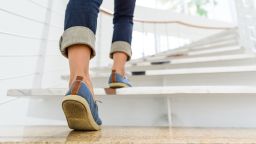Sign up for CNN’s Sleep, But Better newsletter series. Our seven-part guide has helpful hints to achieve better sleep.
If you’re groggy in the morning but perky in the evening, you may be a night owl — a sleep pattern or chronotype that makes you more inclined to want to stay up late and sleep in.
If so, you could be at higher risk of developing type 2 diabetes as well as a number of unhealthy lifestyle habits, a new study found.
“When we looked at the relationship between chronotype and diabetes we found night owls had a 72% increased risk of developing diabetes over the eight years of our study,” said lead author Sina Kianersi, a postdoctoral research fellow at Brigham and Women’s Hospital and Harvard Medical School in Boston.
Researchers also found strong connections between a “late-to-bed-and-rise” sleep style and some unhealthy behaviors — all known contributors to chronic diseases such as type 2 diabetes.
“Night owls overall were more likely to have a poor diet, to be less physically active, to use alcohol in higher quantities, to have an unhealthy BMI (body mass index), to smoke and to sleep less or more than the seven to nine hours that’s recommended each night,” Kianersi said.
When Kianersi and his team factored the unhealthy habits out of the data, the risk of a night owl developing type 2 diabetes dropped to 19% compared with early birds, or people who like to get up and go to bed early.

“Even after accounting for all lifestyle factors, there is a slight increased risk of diabetes, suggesting that there could be some genetic predisposition accounting for both the diabetes and the evening preference or potentially other factors that have not been accounted for,” said Dr. Bhanu Prakash Kolla, a sleep medicine specialist in the Center for Sleep Medicine at the Mayo Clinic in Rochester, Minnesota. He was not involved in the study.
“The main takeaway is that people who have a clear evening preference should be aware of these risks, moderate their alcohol use, eliminate smoking, increase physical activity and get more sleep and manage some of these risks as best as they can,” Kolla said in an email.
What is your sleep chronotype
Everyone has an internal 24-hour body clock, or circadian rhythm, that regulates the release of the hormone melatonin to promote sleep. Personal sleep chronotypes are thought to be inherited; however, with some work, they can be changed.
If you’re an innate early bird, your circadian rhythm releases melatonin much earlier than the norm, energizing you to become most active in the morning. In night owls, however, the internal body clock secretes melatonin much later, making early mornings sluggish and pushing peak activity and alertness later into the afternoon and evening.
But that’s not all. Every cell in the body has its own circadian rhythm — including when you feel hungry, when you void your bowels, when you feel energetic enough to exercise and how well your immune system works. When sleep disrupts those rhythms, the body is out of sync.
“Secretion of hormones can change because of staying up late, our body’s temperature regulation can change, and metabolism can change in a negative way,” Kianersi said. “We get a sort of domino effect, which can increase our risk of having diabetes, cardiovascular disease and other chronic illnesses.”
Early birds tend to perform better in school and are more active throughout the day, which may partly explain why studies have found they have less risk of cardiovascular disease, experts say.
Matching your schedule to your sleep
The study, published Monday in the journal Annals of Internal Medicine, followed nearly 64,000 nurses participating in the Nurses’ Health Study II, one of the largest investigations into the risk factors for major chronic diseases in women.
The study collected data from 2009 to 2017, including self-reported chronotype, diet quality, weight and BMI, sleep timing, smoking behaviors, alcohol use, physical activity and family history of diabetes. That data was then correlated to medical records to determine who developed diabetes.
While researchers found significant associations between developing diabetes in night owls who worked during the day, they did not find an association for night owls who went to work later in the day or worked overnight shifts.
“When chronotype was not matched with work hours we saw an increase in type 2 diabetes risk,” said coauthor Tianyi Huang, an assistant professor of medicine at Harvard Medical School and Associate Epidemiologist of medicine at Brigham and Women’s Hospital, in a statement. “That was another very interesting finding suggesting that more personalized work scheduling could be beneficial.”
The study isn’t the first to find a link between a later sleep chronotype and unhealthy behaviors that might lead to disease. One published in June found night owls were more likely to die early, mostly due to bad habits they developed when they stayed up late, such as drinking and smoking.
A 2022 study determined night owls were more sedentary, had lower aerobic fitness levels and burned less fat at rest and while active than early birds. Night owls were also more likely to be insulin-resistant, a precursor to diabetes. Night owls have higher levels of visceral body fat in the abdominal region, a key risk factor for type 2 diabetes and heart disease.
“A significant portion of the risk of developing diabetes is due to lifestyle,” Kianersi said. “However, because chronotype is shaped by both our genetics and the environment we know that night owls can reduce their risk by maintaining a healthy lifestyle.”
Health - Latest - Google News
September 12, 2023 at 04:32AM
https://ift.tt/zAGjv3p
Bad habits of night owls may lead to type 2 diabetes, study says - CNN
Health - Latest - Google News
https://ift.tt/kODa9ld




No comments:
Post a Comment